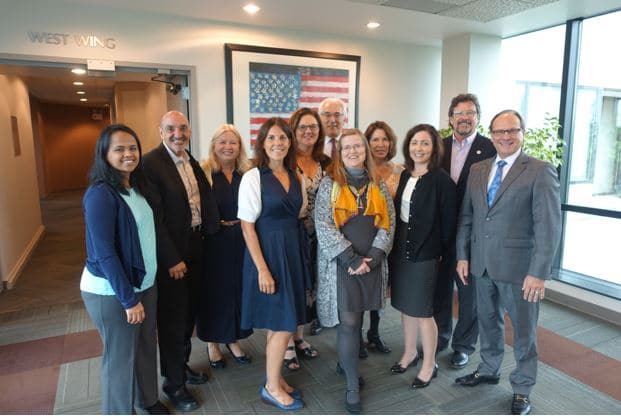Several recent studies have linked hearing loss to diabetes mellitus. In an attempt to raise public awareness of this relationship between these two chronic conditions and other co-morbidities linked to hearing loss of adult onset, the Audiology Project was recently founded.
The founding of the Audiology Project occurred after five years of engaging in ongoing dialogue with small group of audiologists lead by audiologist, Kathy Dowd, communicating with the Centers for Disease Control about diabetic ear disease. The Audiology Project officially began as a not-for-profit in 2016 with a mission of improving the lives of people with chronic conditions, such as diabetes-induced hearing loss and balance problems through early audiology diagnosis, treatment and management. Until very recently, the comorbidity of hearing loss, balance and diabetes was unknown to many agencies (including The Centers for Disease Control).
Thanks to early advocacy efforts in 2011 by the (now) Audiology Project Executive Director, Dr. Kathy Dowd, both the American Diabetes Association and Johnson and Johnson Diabetes Institute publicly recognized these concerns with diabetes and hearing and balance difficulties in 2013. In the spring of 2016 CDC considered adding the recommendation for audiology evaluations for patients with diabetes in their updated publication “Taking Care of Your Diabetes”.
Enhancing Awareness
In light of the welcome awareness by the CDC and recommendations by Johnson and Johnson Diabetes Institute director and American Optometric Association public health officer, a stakeholders meeting was convened by the Audiology Project on September 28, 2016 and hosted by Salus University in Elkins Park, PA. The three primary audiology associations (AAA, ADA and ASHA ) were invited to attend and participate.
Presenters at the meeting included CDC, American Association of Diabetes Education, American Optometric Association, Pharmacology and other audiology stakeholders. The meeting focused on ways to develop educational materials, establishing universal clinical audiological guidelines and to raise national awareness of diabetic ear disease. At the end of the meeting, all three of the primary audiology organizations, articulated the need to have a not-for-profit organization, such as the Audiology Project, to orchestrate the efforts in formulating and directing all agreed upon programs pertaining to chronic disease and audiological management hearing loss and balance disorders at government, university and audiology practices.

Pictured, left to right, are Dr. Radhika Aravamudhan, Osborne College of Audiology; Dr. Neil DiSarno, PhD, American Speech-Language-Hearing Association chief staff officer for audiology; Dr. Janice Scharre, Salus University; Ms. Joanne Rinker, American Association of Diabetes Educators; Dr. Angela Morris AuD ’03, Academy of Doctors of Audiology president-elect; Dr. Robert DiSogra AuD ’03, Consulting Audiologist; Dr. Jackie Clark, PhD, American Academy of Audiology president-elect; Dr. Kathy Dowd Aud ’08, The Audiology Project; Ms. Stephanie Czuhajewski, Academy of Doctors of Audiology executive director; Dr. Victor Bray, MSC, PhD, FNAP, Audiology Academy National Academies of Practice; and Dr. Richard Gans, PhD, American Institute of Balance. Meeting presenters who are not present in the photo included Dr. Pamela Allweiss, Centers for Disease Control and Prevention; Dr. Jerry Meece, Director of Clinical Services, Plaza Pharmacy; Dr. Lynn Greenspan, American Optometric Association; and Dr. Chris Spankovich, University of Mississippi Medical Center.
The Audiology Project is working with AAA and ADA to gather subject matter experts in the areas of diabetes and associated hearing/balance disorders. For more information on the Audiology Project and if you are interested in working with the group, please contact Kathy Dowd, AuD at kdowd01@att.net or visit their website: www.theaudiologyproject.com






To some extent it has always been known that diabetes does draw out the manufacture of potassium ions from the stria vascularis. Potassium is the key neuroransmitter involved in the opening of gated channels at the base of IHC’s in the cochlea.